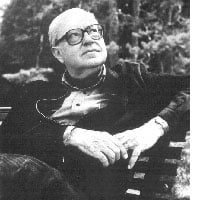Alberto Ginastera: An interview with his daughter, Georgina

<dir=ltr align=left>Georgina Ginastera reflects on the life and career of her father, Alberto
<dir=ltr align=left>How would you characterize your father? Was he a "family man?"
Yes, absolutely. He was a family man who loved his home and was a very good father. He loved decoration and rearranging his books, buying flowers to put on the piano, and organizing dinner parties with friends, which was a frequent occurrence. My home was a meeting place for Argentine and foreign artists. His students also came over, and the evenings ended around the piano, playing tangos, jazz, or bossa nova, and the whole family participated in these gatherings. The visit I remember the most was Stravinsky’s; what surprised me was how small he was. I thought he was big, as his music was great.
What are some special memories you have from your childhood?
My first memory related to art is the Teatro Colón. It was awesome! I must have been three years old, and I ran down those huge red aisles, and heard my father’s voice saying, "Georgina, don´t run!" I thought that the Colón was a place to play. Even today I feel the same emotion each time I go there. As to family memories, I fondly remember the long summer holidays at the beach. Alberto, my father, became different; he liked fishing, long walks, swimming in the sea, and reading novels. Music seemed to disappear... but I don’t think it was so: he had all the music in his mind.
What was his compositional process like? Was he always at the piano?
He composed at night. He needed the silence and stillness to concentrate on his own sounds. His studio was right next to my bedroom, and I could hear him (while I was falling asleep) searching for notes. The piano was his musical companion, and he said that the piano replaced the whole orchestra; through the piano he expressed his inner being. Those obsessive sounds were for me the "sounds of my childhood"—the repeated search for notes I heard in the middle of the night.
Would you say he was meticulous putting the finishing touches on his compositions?
He was very meticulous, and a perfectionist. He was also this way in everyday life. He was a smart dresser—he loved ties and had a big collection. He was interested in the small details of our home (for example, how the table was set for guests). He was equally thorough about his music. Once he wrote me a letter from Geneva and said, "...every page takes me a couple of days’ work, isn´t it incredible? It’s because I’m a very slow composer, due to my perfectionism..." He revised his work once and again before handing it to his editors, and was always backed up. Maybe this is the reason why he didn’t write that many compositions.
Has music in Latin America changed because of your father’s influence?
I think that he has a place among composers such as Chavez and Revueltas in Mexico, and Villa-Lobos in Brazil, that were part of a Latin American school of music. My father fostered creative freedom among his students: "Write whatever you want!" he told them. In my opinion, his most important student was Astor Piazzolla who came from the popular tango, and through my father’s teachings—above all, his orchestration techniques—was able to create the New Tango.
What would you say is the lasting legacy of Alberto Ginastera?
Of course his most important legacy is his music. I believe it is a huge and universal legacy. In my opinion, there are two pillars: first, the body of piano works, and second, his orchestral works. These two pillars are played around the world, from east to west, from north to south. His work is understood, accepted, and loved by the public, with performances often receiving a standing ovation. He used to tell me: "I’m not sure what success is, but for me it means that in 100 years my work will still be played and listened to by the public." Thirty years after his physical disappearance this is still happening...
Interview conducted by Patrick Gullo
